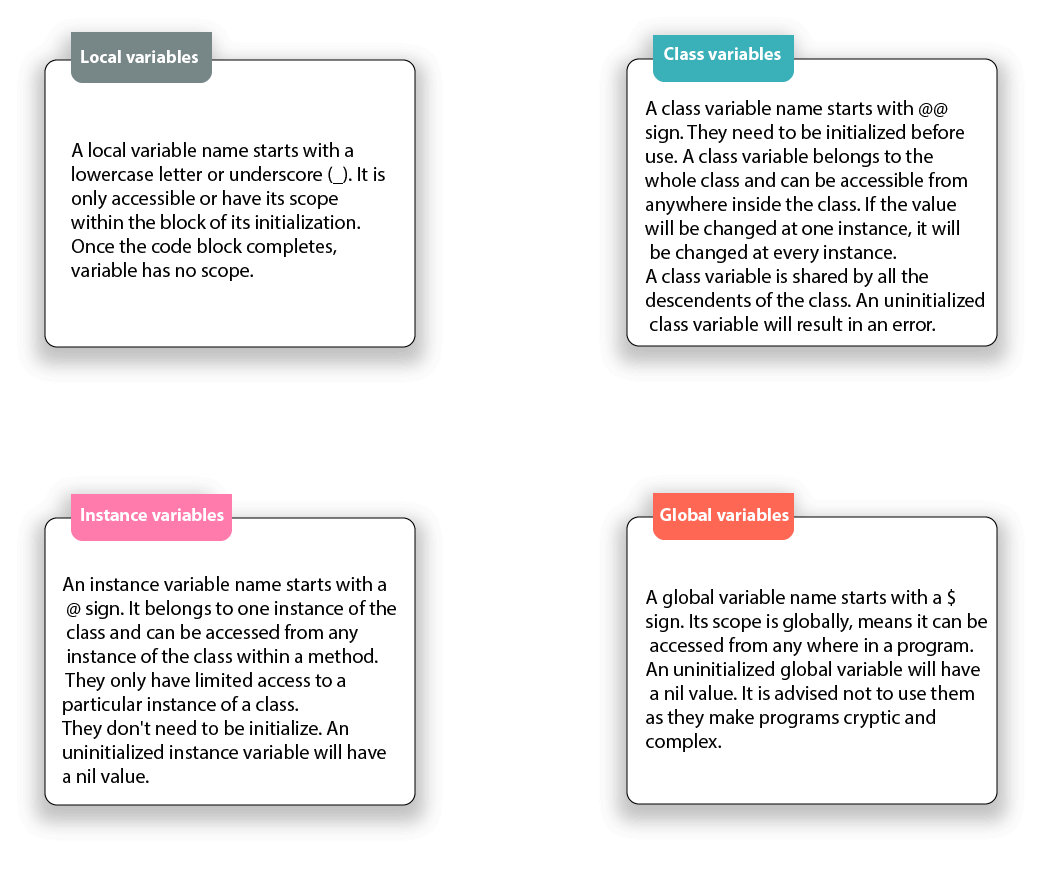📌 相关文章
- 字符串中的 ruby 变量 - Ruby (1)
- 字符串中的 ruby 变量 - Ruby 代码示例
- Ruby 中的实例变量
- Ruby 中的实例变量(1)
- Ruby块
- Ruby-块(1)
- 类 ruby (1)
- Ruby块(1)
- !在 ruby 中(1)
- Ruby-块
- ruby |= - Ruby (1)
- ruby |= - Ruby 代码示例
- ruby 方法 - Ruby (1)
- ruby 方法 - Ruby 代码示例
- ruby 时间戳 - Ruby (1)
- ruby 在没有访问器的情况下获取实例变量 - Ruby (1)
- ruby 数组有元素 - Ruby (1)
- C#-空变量
- C# 变量 - C# (1)
- C++变量(1)
- 去变量(1)
- 变量 c# (1)
- R变量
- C-变量
- R-变量(1)
- 变量 - C# (1)
- C++变量
- C#-空变量(1)
- C#变量
📜 Ruby变量
📅 最后修改于: 2021-01-08 12:57:49 🧑 作者: Mango
Ruby变量
Ruby变量是保存要在程序中使用的数据的位置。每个变量都有不同的名称。这些变量名称基于某些命名约定。与其他编程语言不同,无需在Ruby中声明变量。需要一个前缀来表示它。
Ruby中有四种类型的变量:
- 局部变量
- 类变量
- 实例变量
- 全局变量

局部变量
局部变量名称以小写字母或下划线(_)开头。它只能访问或在其初始化块内包含其范围。代码块完成后,变量将没有作用域。
当调用未初始化的局部变量时,它们被解释为对没有参数的方法的调用。
类变量
类变量名以@@符号开头。它们需要在使用前进行初始化。一个类变量属于整个类,可以从该类内部的任何地方访问。如果该值将在一个实例中更改,则它将在每个实例中更改。
类变量由该类的所有后代共享。未初始化的类变量将导致错误。
例:
#!/usr/bin/ruby
class States
@@no_of_states=0
def initialize(name)
@states_name=name
@@no_of_states += 1
end
def display()
puts "State name #@state_name"
end
def total_no_of_states()
puts "Total number of states written: #@@no_of_states"
end
end
# Create Objects
first=States.new("Assam")
second=States.new("Meghalaya")
third=States.new("Maharashtra")
fourth=States.new("Pondicherry")
# Call Methods
first.total_no_of_states()
second.total_no_of_states()
third.total_no_of_states()
fourth.total_no_of_states()
在上面的示例中,@@ no_of_states是一个类变量。
输出:

实例变量
实例变量名称以@符号开头。它属于该类的一个实例,并且可以在方法中从该类的任何实例进行访问。他们只能访问类的特定实例。
他们不需要初始化。未初始化的实例变量的值为nil。
例:
#!/usr/bin/ruby
class States
def initialize(name)
@states_name=name
end
def display()
puts "States name #@states_name"
end
end
# Create Objects
first=States.new("Assam")
second=States.new("Meghalaya")
third=States.new("Maharashtra")
fourth=States.new("Pondicherry")
# Call Methods
first.display()
second.display()
third.display()
fourth.display()
在上面的示例中,@states_name是实例变量。
输出:

全局变量
全局变量名称以$符号开头。它的范围是全局的,这意味着可以从程序中的任何位置访问它。
未初始化的全局变量将具有nil值。建议不要使用它们,因为它们会使程序变得晦涩复杂。
Ruby中有许多预定义的全局变量。
例:
#!/usr/bin/ruby
$global_var = "GLOBAL"
class One
def display
puts "Global variable in One is #$global_var"
end
end
class Two
def display
puts "Global variable in Two is #$global_var"
end
end
oneobj = One.new
oneobj.display
twoobj = Two.new
twoobj.display
在上面的示例中,@states_name是实例变量。
输出:

概要
| Local | Global | Instance | Class | |
|---|---|---|---|---|
| Scope | Limited within the block of initialization. | Its scope is globally. | It belongs to one instance of a class. | Limited to the whole class in which they are created. |
| Naming | Starts with a lowercase letter or underscore (_). | Starts with a $ sign. | Starts with an @ sign. | Starts with an @@ sign. |
| Initialization | No need to initialize. An uninitialized local variable is interpreted as methods with no arguments. | No need to initialize. An uninitialized global variable will have a nil value. | No need to initialize. An uninitialized instance variable will have a nil value. | They need to be initialized before use. An uninitialized global variable results in an error. |